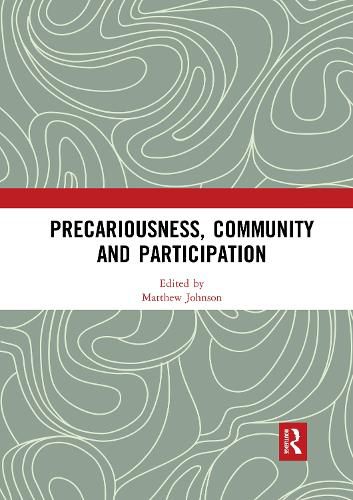Readings Newsletter
Become a Readings Member to make your shopping experience even easier.
Sign in or sign up for free!
You’re not far away from qualifying for FREE standard shipping within Australia
You’ve qualified for FREE standard shipping within Australia
The cart is loading…






This book attempts to explore the effects of neoliberalism on particular forms of community. Guy Standing (2011) has popularised the notion of precariousness to describe the unpredictable neoliberal conditions faced by radically different people throughout the world. Members of Standing’s ‘precariat’ lack occupational identities, treat work and other moneymaking activities instrumentally, are focused on the short-term and have no ‘shadow of the future’ hanging over their actions, leaving little incentive to sustain long-term relationships and productive, but unpaid, social activities. This issue presents an interdisciplinary account of the challenges faced by communities at a time in which neoliberalism seems unchecked and uncheckable by the rise of nationalist populism. At points, responses are presented, but it is perhaps reflective of the general sense of helplessness of those committed to tackling neoliberalism that the final article highlights serious deficits in an approach commonly presented as a practicable response: basic income. In the spirit of participation, each article is accompanied by a reply by a non-academic as well as an academic. This ought not to be seen as tokenism - the experience of the project has been that discussions can be advanced much more effectively through engagement with community members and professionals.
The chapters in this book were originally published as a special issue of Global Discourse.
$9.00 standard shipping within Australia
FREE standard shipping within Australia for orders over $100.00
Express & International shipping calculated at checkout
This book attempts to explore the effects of neoliberalism on particular forms of community. Guy Standing (2011) has popularised the notion of precariousness to describe the unpredictable neoliberal conditions faced by radically different people throughout the world. Members of Standing’s ‘precariat’ lack occupational identities, treat work and other moneymaking activities instrumentally, are focused on the short-term and have no ‘shadow of the future’ hanging over their actions, leaving little incentive to sustain long-term relationships and productive, but unpaid, social activities. This issue presents an interdisciplinary account of the challenges faced by communities at a time in which neoliberalism seems unchecked and uncheckable by the rise of nationalist populism. At points, responses are presented, but it is perhaps reflective of the general sense of helplessness of those committed to tackling neoliberalism that the final article highlights serious deficits in an approach commonly presented as a practicable response: basic income. In the spirit of participation, each article is accompanied by a reply by a non-academic as well as an academic. This ought not to be seen as tokenism - the experience of the project has been that discussions can be advanced much more effectively through engagement with community members and professionals.
The chapters in this book were originally published as a special issue of Global Discourse.